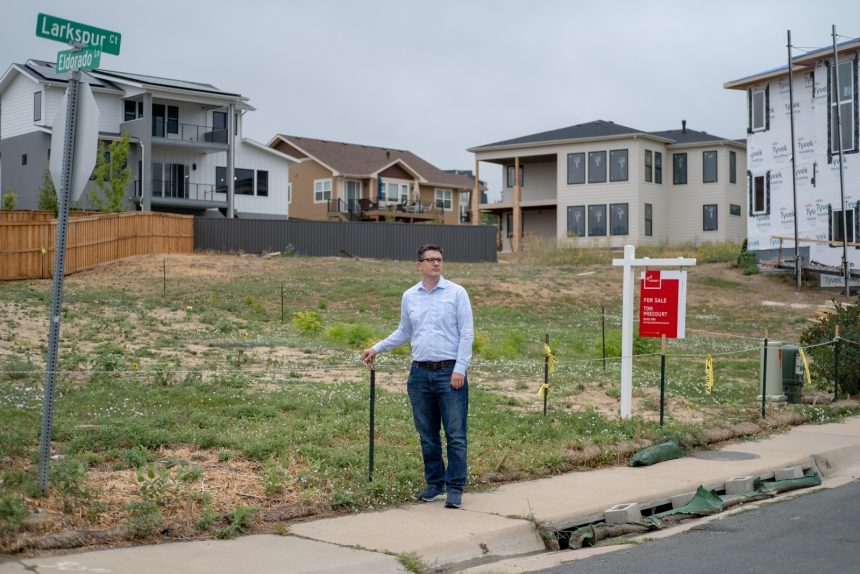This story is part of State of Emergency, a Grist series exploring how climate disasters are impacting voting and politics, and is published with support from the CO2 Foundation. As the one-year anniversary of the 2021 Marshall Fire approached, Kyle Brown was serving as a city councilman in Louisville, Colorado, a suburb of Boulder that had been devastated by the blaze. Brown’s own home had escaped damage, but hundreds of his neighbors had lost everything to the costliest and deadliest fire in the state’s history, which caused more than $2 billion in damages and destroyed more than a thousand structures. Despite Brown’s efforts to help the victims, the fire recovery was stalling out. Displaced residents were struggling to secure insurance payouts and scrape together cash to rebuild their homes, and most couldn’t afford the jacked-up rents in the area. The City Council was supposed to be helping these victims, but instead it was locked in a dispute with them over whether they should have to pay local taxes on building materials.
Brown was desperate for a way to do more. When the incumbent state representative in the area resigned after it emerged that she didn’t live in the district, he saw an opportunity and put his name forward as her replacement. What happened next is one of the rare disaster recovery success stories in recent U.S. history. After securing a seat in the state legislature, Brown, a Democrat, spent the next two years working with a highly organized group of survivors to pass a suite of ambitious bills that have made Colorado a national leader in responding to climate disasters. Many of the same issues crop up across the country after fires and floods, but survivors rarely succeed in getting lawmakers to pay attention to any of them, let alone all of them. Brown, however, was able to gain bipartisan support for bills that give fire survivors leverage against insurers, mortgage companies, homeowners associations, and rental property owners, elevating concerns that have often been ignored in other disaster-prone states.
Kyle Brown has been in the Colorado House of Representatives for less than two years, but he’s already passed several bills that aim to protect fire victims from predatory behavior by insurers, landlords, and mortgage lenders. Eli Imadali / Grist This legislative success wasn’t thanks to any political horse-trading or inspiring rhetoric on Brown’s part. Rather, it’s the result of a hand-in-glove collaboration with a well-organized and often militant group of fire survivors, drafting bills based on their recommendations and needs, and allowing them to tweak and strengthen legislation where necessary.
“We needed to accelerate the pace of recovery, so I just listened,” said Brown in an interview with Grist. “I took notes on everything they said, and I turned it over, and I turned it into bills.” This combination of organized advocacy by disaster survivors and ambitious lawmaking by sympathetic politicians could become a model for other disaster-prone places, but it was only possible because many well-heeled Marshall Fire victims had the resources to organize and press for change after the fire, a luxury most disaster-stricken communities don’t have. Lower-income communities around Colorado may benefit from the Marshall legislation, but it may be difficult for survivors in other parts of the country to emulate it.
Survivors walk through what remains of a house destroyed by the Marshall Fire, which burned around 1,000 homes in the Boulder suburbs.Michael Ciaglo / Getty Images The Marshall Fire wasn’t like the massive forest fires that have tortured Northern California or the desert blazes that rage across Texas and New Mexico each year. It ripped down from the Front Range in December of 2021 and all but vaporized a fast-growing, gentrified segment of the Denver metroplex, bringing about what climate scientist Daniel Swain calls the “urban firestorm.” High winds whipped the grass fire to full size in a matter of hours, igniting vegetation that had dried out during a severe drought of the kind that global warming is making more common. In contrast to California, where burned communities have often been rural and less well-off, the Boulder suburbs of Louisville and Superior are dense and suburban, filled with well-to-do lawyers and consultants. For that reason, there were several fire victims who had the time and money to become volunteer recovery advocates. One of those survivors was a patent lawyer named Tawnya Somauroo, who was galvanized to action when she learned that Louisville had not issued an evacuation order for her subdivision, most of which burned in the fire. She spent months bird-dogging the mayor’s office and local law enforcement on her own time to ask about their evacuation procedures, but found herself making little progress.
“I didn’t even know where City Hall was before the fire,” Somauroo told Grist. “I just started calling city council members and talking to them and getting not a very good reception at first. It just became this narrative of, ‘the survivors versus everyone else.’” In other words, elected officials were weighing the need to finance the rebuilding of public parks and facilities against the need to help the hundreds of displaced homeowners. As Somauroo watched local Facebook groups devolve into hubbub and confusion, she turned to a less commonly used app to make order out of the chaos — she downloaded Slack, the messaging platform normally used in white-collar workplaces, and invited hundreds of locals to join her there. The app allowed survivors to create individual message threads to discuss specific insurers, specific permits, and specific federal aid deadlines.
“People would join a certain thread, and then someone would pop up who had the same problem, and then coach them [on] how they solved it,” she said. “And you know, little by little, we started identifying problems that way.”
Tawnya Somauroo stands outside of her family’s new fire-resistant home in Louisville, Colorado. After she lost her house to the Marshall Fire, Somauroo founded a nonprofit that advocates for fire survivors. Eli Imadali / Grist Meanwhile, a former Boulder resident named Jeri Curry moved back to the area from Virginia to help aid in the long-term recovery. She and a group of fellow volunteers established a long-term recovery center in an office park, opening it up about 10 months after the fire as the Federal Emergency Management Agency and the state of Colorado wound down their recovery operations. In addition to providing free food and computer access, the center provided guidance to survivors navigating the process of filing an insurance claim and applying for FEMA aid. “The big thing that we believed the community overall needed was a gathering place, a central place where people could get everything that they needed,” she said. “The agencies put their mission first, their service delivery and resource delivery first, and they don’t put the survivor in the middle.” These casework conversations alerted volunteers to the dynamics holding back the recovery — lowball cost estimates from insurers, delays in securing claim payouts, and construction material sales taxes that many residents were struggling to pay. Frustrated with the response from city officials, the survivors’ group — now incorporated as a nonprofit — decided to team up with their new state legislator, Brown, who was looking for ways to help fire victims. Brown had worked for Colorado’s insurance department while serving on the Louisville city council and had experience dealing with complex policy issues, but property insurance and housing law were new to him. So he relied on Somauroo’s expertise, letting her and the other survivors guide the bills he wrote and introduced. This strategy soon produced a number of laws that gave immediate financial relief to fire survivors who had been struggling to rebuild. Brown passed a bill that stopped mortgage servicers from holding back insurance payments from customers who were waiting to rebuild, eliminating a delay that stopped many survivors from rebuilding for months. He passed a bill that required insurers to take into account the state’s own estimates of rebuilding costs, a measure designed to stop them from lowballing homeowners trying to rebuild. Bills that gave survivors grants for rebuilding with fire-safe materials, provided them with rebates on construction material taxes, and plowed resources into studying smoke and ash damage all sailed through the legislature.






